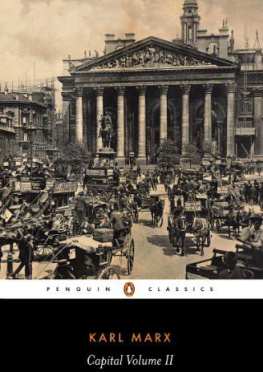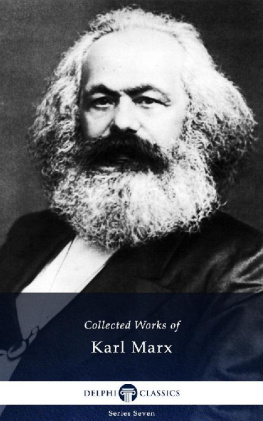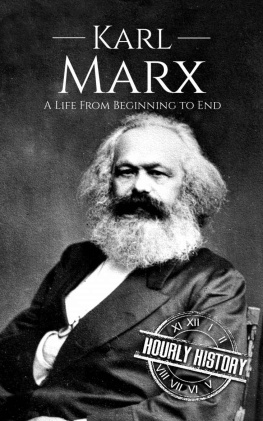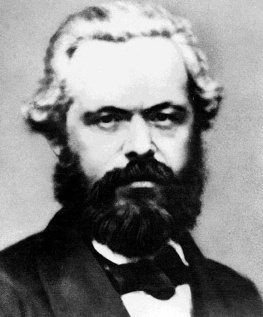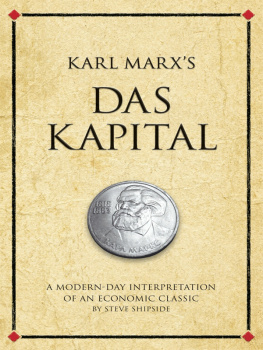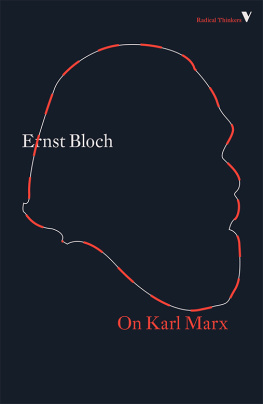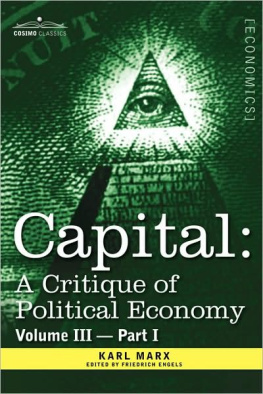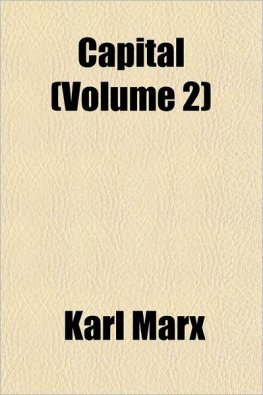Karl Marx - The Civil War in France
Here you can read online Karl Marx - The Civil War in France full text of the book (entire story) in english for free. Download pdf and epub, get meaning, cover and reviews about this ebook. year: 2009, publisher: Dodo Press, genre: Science. Description of the work, (preface) as well as reviews are available. Best literature library LitArk.com created for fans of good reading and offers a wide selection of genres:
Romance novel
Science fiction
Adventure
Detective
Science
History
Home and family
Prose
Art
Politics
Computer
Non-fiction
Religion
Business
Children
Humor
Choose a favorite category and find really read worthwhile books. Enjoy immersion in the world of imagination, feel the emotions of the characters or learn something new for yourself, make an fascinating discovery.
- Book:The Civil War in France
- Author:
- Publisher:Dodo Press
- Genre:
- Year:2009
- Rating:4 / 5
- Favourites:Add to favourites
- Your mark:
- 80
- 1
- 2
- 3
- 4
- 5
The Civil War in France: summary, description and annotation
We offer to read an annotation, description, summary or preface (depends on what the author of the book "The Civil War in France" wrote himself). If you haven't found the necessary information about the book — write in the comments, we will try to find it.
The Civil War in France — read online for free the complete book (whole text) full work
Below is the text of the book, divided by pages. System saving the place of the last page read, allows you to conveniently read the book "The Civil War in France" online for free, without having to search again every time where you left off. Put a bookmark, and you can go to the page where you finished reading at any time.
Font size:
Interval:
Bookmark:
Written: July 1870 - May 1871;
First Published: 1871;
Source: English Edition of 1871;
Transcription/Markup: Zodiac & Brian Baggins;
Proofed: and corrected by Matthew Carmody 2009;
HTML Source: http://www.marxists.org/archive/marx/works/1871/civil-war-france/index.htm;
Appendix
Written by Karl Marx as an address to the General Council of the International, with the aim of distributing to workers of all countries a clear understanding of the character and world-wide significance of the heroic struggle of the Communards and their historical experience to learn from. The book was widely circulated by 1872 it was translated into several languages and published throughout Europe and the United States.
The first address was delivered on July 23rd, 1870, five days after the beginning of the Franco-Prussian War. The second address, delivered on September 9, 1870, gave a historical overview of the events a week after the army of Bonaparte was defeated. The third address, delivered on May 30, 1871, two days after the defeat of the Paris Commune detailed the significance and the underlining causes of the first workers government ever created.
Publication Information: The Civil War in France was originally published by Marx as only the third address (here comprising Chapters 3 through 6) separated into four chapters. In 1891, on the 20th anniversary of the Paris Commune, Engels put together a new collection of the work. Engels decided to include the first two addresses that Marx made to the International (Chapters 1 and 2) in this way providing additional historical background to the Civil War; Marxs account of the Franco-Prussian War (July to September, 1870). In this publication, basic titles have been provided for each chapter in brackets, to give the unfamiliar reader a basic guide to the historical events each chapter discusses. Also, Engels 1891 introduction has been separated into two parts: an introduction (below) and a postscript.
On the 20th Anniversary of the Paris Commune
Thanks to the economic and political development of France since [the French Revolution of]1789, for 50 years the position of Paris has been such that no revolutionscould break out there without assuming a proletarian character, that isto say, the proletariat, which had bought victory with its blood,would advance its own demands after victory. These demands were more or lessunclear and even confused, corresponding to the state of evolution reachedby the workers of Paris at the particular period, but in the last resortthey all amounted to the abolition of the class antagonism between capitalistand workers. It is true that no one knew how this was to be brought about.But the demand itself, however indefinite it still was in its formulation,contained a threat to the existing order of society; the workers who putit forward were still armed; therefore the disarming of the workers wasthe first commandment for the bourgeois at the helm of the state. Hence,after every revolution won by the workers, a new struggle, ending withthe defeat of the workers.
these had acquired far more political independencethan the bourgeoisie, and even the republicans, suspected. At the momentof the crisis between the government and the opposition, the workers openedbattle on the streets; [King] Louis Philippe vanished, and with him the franchisereform; and in its place arose the republic, and indeed one which the victoriousworkers themselves designated as a social republic. No one, however,was clear as to what this social republic was to imply; not even the workersthemselves. But they now had arms in their hands, and were a power in thestate. Therefore, as soon as the bourgeois republicans in control feltsomething like firm ground under their feet, their first aim was to disarmthe workers. This took place by driving them into the insurrection of June1848 by direct breach of faith, by open defiance and the attempt to banishthe unemployed to a distant province. The government had taken care tohave an overwhelming superiority of force. After five days heroic struggle,the workers were defeated. And then followed a blood-bath of the defencelessprisoners, the likes of which as not been seen since the days of the civilwars which ushered in the downfall of the Roman republic. It was the firsttime that the bourgeoisie showed to what insane cruelties of revenge itwill be goaded the moment the proletariat dares to take its stand againstthem as a separate class, with its own interests and demands. And yet 1848was only childs play compared with their frenzy in 1871.
Punishment followed hard at heel. If the proletariat was not yetable to rule France, the bourgeoisie could no longer do so. At least notat that period, when the greater part of it was still monarchically inclined,and it was divided into three dynastic parties [Legitimists, Orleanists and Bonapartists] and a fourth republicanparty. Its internal dissensions allowed the adventurer Louis Bonaparteto take possession of all the commanding points army, police, administrativemachinery and, on December 2, 1851, to explode the last stronghold of the bourgeoisie, the National Assembly. The Second Empire opened the exploitationof France by a gang of political and financial adventurers, but at thesame time also an industrial development such as had never been possibleunder the narrow-minded and timorous system of Louis Philippe, with itsexclusive domination by only a small section of the big bourgeoisie. LouisBonaparte took the political power from the capitalists under the pretextof protecting them, the bourgeoisie, from the workers, and on the otherhand the workers from them; but in return his rule encouraged speculationand industrial activity in a word the rise and enrichment of the wholebourgeoisie to an extent hitherto unknown. To an even greater extent, itis true, corruption and mass robbery developed, clustering around the imperialcourt, and drawing their heavy percentages from this enrichment.
But the Second Empire was the appeal to the French chauvinism,the demand for the restoration of the frontiers of the First Empire, whichhad been lost in 1814, or at least those of the First Republic. A Frenchempire within the frontiers of the old monarchy and, in fact, within theeven more amputated frontiers of 1815 such a thing was impossible forany long duration of time. Hence the necessity for brief wars and extensionof frontiers. But no extension of frontiers was so dazzling to the imaginationof the French chauvinists as the extension to the German left bank of theRhine. One square mile on the Rhine was more to them than ten in the Alpsor anywhere else. Given the Second Empire, the demand for the restorationto France of the left bank of the Rhine, either all at once or piecemeal,was merely a question of time. The time came with the Austro-Prussian Warof 1866; cheated of the anticipated territorial compensation by Bismarck,and by his own over-cunning, hesitating policy, there was now nothing leftfor Napoleon but war, which broke out in 1870 and drove him first to Sedan,and then to Wilhelmshohe [prison].
The inevitable result was the Paris Revolution of September 4,1870. The empire collapsed like a house of cards, and the republic wasagain proclaimed. But the enemy was standing at the gates [of Paris]; the armies ofthe empire were either hopelessly beleaguered in Metz or held captive inGermany. In this emergency the people allowed the Paris Deputies to theformer legislative body to constitute themselves into a Government ofNational Defence. This was the more readily conceded, since, for the purposeof defence, all Parisians capable of bearing arms had enrolled in the NationalGuard and were armed, so that now the workers constituted a great majority.But almost at once the antagonism between the almost completely bourgeoisgovernment and the armed proletariat broke into open conflict. On October31, workers battalions stormed the town hall, and captured some membersof the government. Treachery, the governments direct breach of its undertakings,and the interventions of some petty-bourgeois battalions set them freeagain, and in order not to occasion the outbreak of civil war inside acity which was already beleaguered by a foreign power, the former governmentwas left in office.
Font size:
Interval:
Bookmark:
Similar books «The Civil War in France»
Look at similar books to The Civil War in France. We have selected literature similar in name and meaning in the hope of providing readers with more options to find new, interesting, not yet read works.
Discussion, reviews of the book The Civil War in France and just readers' own opinions. Leave your comments, write what you think about the work, its meaning or the main characters. Specify what exactly you liked and what you didn't like, and why you think so.



